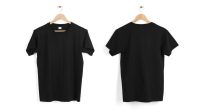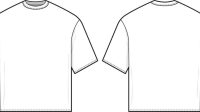The Indispensable Role of "Shirt" in Standard American English
In the vast tapestry of human language, words serve as the essential threads that weave together our thoughts, ideas, and emotions. Among this intricate lexicon, the humble yet ubiquitous word "shirt" holds a position of paramount importance in Standard American English, shaping our communication in countless ways.
A Garment of Versatility and Utility
At its most fundamental level, a shirt is a garment designed to cover the upper body. It encompasses a wide spectrum of styles, from formal dress shirts to casual T-shirts, each serving a distinct purpose and occasion.
In professional settings, the dress shirt reigns supreme, embodying authority and sophistication. Its crisp lines, tailored fit, and button-down collar convey a sense of order and competence. In contrast, casual shirts offer a more relaxed and comfortable option, allowing for greater freedom of movement and self-expression.
Beyond its aesthetic appeal, a shirt also provides crucial protection against the elements. In warm weather, it shields the skin from the sun’s harmful rays, while in colder climates, it insulates against the frigid air. Its versatility makes it an indispensable wardrobe staple, adaptable to any situation.
A Linguistic Building Block
In the realm of language, "shirt" serves as a cornerstone of Standard American English, contributing to the formation of numerous idioms, phrases, and proverbs. Its multifaceted nature allows it to be used in both literal and figurative contexts, expanding its semantic range and enriching our communication.
The Figurative Power of Shirt
When we say that someone "wears their heart on their shirt," we evoke the idea of vulnerability and transparency. The shirt becomes a metaphor for the emotions that we choose to display to the world. Similarly, the saying "to have a chip on one’s shoulder" suggests a grudging or resentful attitude, with the shirt representing the metaphorical burden that we carry.
In a more humorous vein, the phrase "to give someone the shirt off your back" conveys a gesture of extreme generosity, implying a willingness to sacrifice one’s own comfort for the benefit of another. The shirt becomes a symbol of both physical and emotional support.
Idioms and Phrases Involving Shirt
- Born with a silver shirt in their mouth: To be born into wealth and privilege.
- To have a shirt made of Teflon: To be impervious to criticism or negative consequences.
- To be caught with one’s shirt down: To be caught unprepared or embarrassed.
- To be on the same shirt: To be in agreement or on the same team.
- To wash one’s dirty shirts in public: To air one’s personal problems or grievances openly.
Proverbs Featuring Shirt
- A clean shirt never goes out of style: The importance of maintaining a good appearance.
- A shirt is always worth a smile: The value of a simple act of kindness.
- A shirt without a collar is like a house without a roof: The necessity of proper preparation and attention to detail.
- A shirt that fits is a shirt that feels good: The importance of choosing the right path in life.
- A shirt is a shirt, no matter how you fold it: The futility of trying to change something’s essential nature.
Stylistic and Grammatical Considerations
In Standard American English, the word "shirt" is typically used as a count noun, referring to a single item of clothing. However, in informal contexts, it can occasionally be used as a non-count noun, indicating a general type of garment. For example, one might say, "I need to buy some shirts" rather than "I need to buy some shirt."
The plural form of "shirt" is "shirts," which is formed by adding the regular -s suffix. However, in the case of compound words, the plural form can vary. For instance, the plural of "dress shirt" is "dress shirts," while the plural of "T-shirt" is "T-shirts."
In terms of grammatical function, "shirt" can serve as a subject, object, or complement in a sentence. Its versatility позволяет it to be used in various syntactic structures, enhancing the expressive power of Standard American English.
Conclusion
The word "shirt" is not merely a garment but an integral part of the fabric of Standard American English. Its versatility, functionality, and linguistic significance make it an indispensable tool for communication, allowing us to express a wide range of ideas, emotions, and experiences. From the crisp white collars of professional attire to the cozy comfort of casual wear, the shirt holds a special place in our lexicon and our lives. As the language evolves, so too will the role of "shirt," but its importance is certain to endure.
Frequently Asked Questions
1. What are the different types of shirts?
There are numerous types of shirts available, ranging from formal to casual, including:
- Dress shirts
- Oxford shirts
- Polo shirts
- T-shirts
- Button-down shirts
- Flannel shirts
- Denim shirts
- Hawaiian shirts
- Tank tops
2. How do I choose the right shirt?
When selecting a shirt, consider factors such as the occasion, the weather, and your personal style. For formal occasions, a dress shirt is generally appropriate, while for casual settings, a T-shirt or polo shirt may be more suitable.
3. What are some common idioms and phrases involving the word "shirt"?
Some common idioms and phrases involving the word "shirt" include:
- To wear your heart on your shirt
- To have a chip on your shoulder
- To give someone the shirt off your back
- To be born with a silver shirt in your mouth
- To wash one’s dirty shirts in public
4. How do I care for a shirt?
The care instructions for a shirt will vary depending on its material. Always check the care label for specific instructions. In general, shirts can be washed in a washing machine using cold water and mild detergent. They should be dried on a low heat setting or air-dried.
5. What is the difference between a shirt and a blouse?
In Standard American English, the terms "shirt" and "blouse" are often used interchangeably to refer to a garment that covers the upper body. However, in some contexts, a "blouse" may be considered more feminine or formal than a "shirt."






